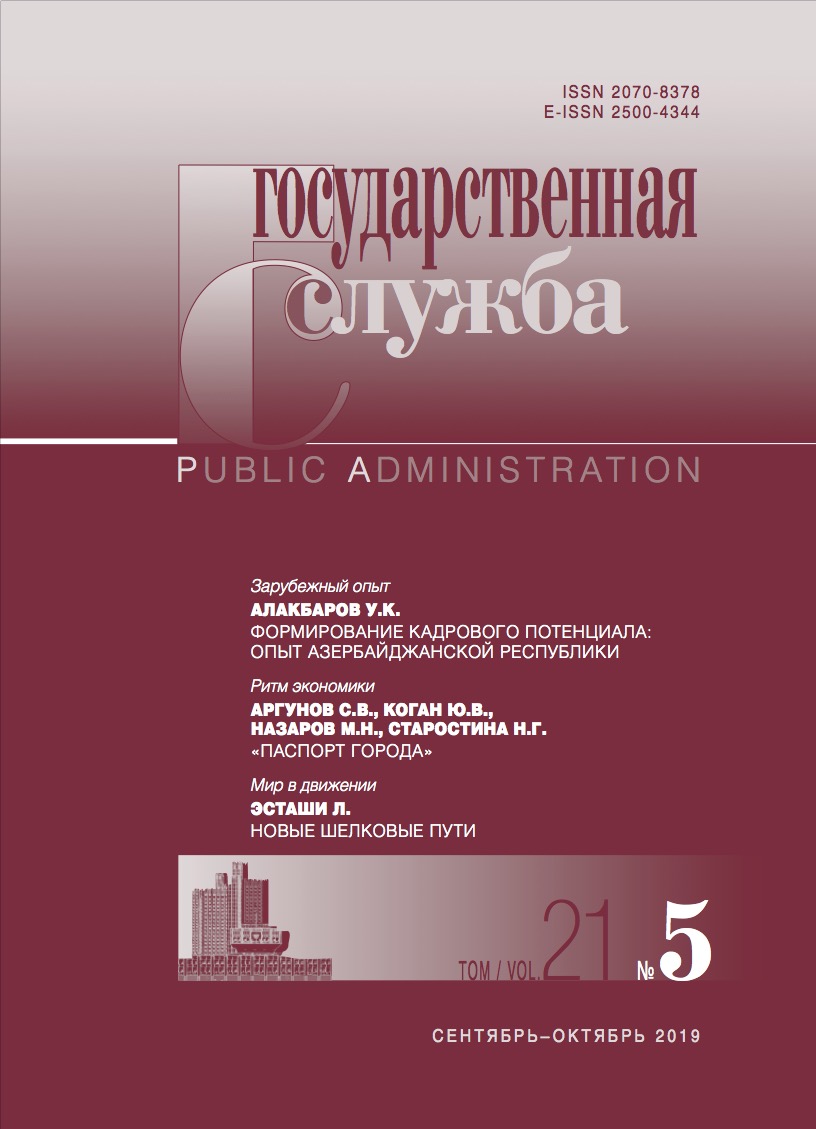Recommended link to article:
AIDYN O. TURGANBAEVа
DOI: 10.22394/2070-8378-2019-21-5-49-54
Abstract:
The article is devoted to the study of the possibilities of introduction and use of artificial intelligence technologies in strategic planning in public administration. The paper investigates the reasons for the introduction of new information and computer-software technologies, their necessity. The author considers the issue of defects in strategic planning documents. In the study, based on the application of scientific methods of system analysis, synthesis, induction and classification, the author developed the concept of describing the determinants of the need and rational validity of integration, the use of technologies and units of artificial intelligence for strategic planning in public administration. In the conditions of diversified complications and increase in the number of factors affecting the result of design, adoption and implementation of management decisions in public administration, the complexity of the ontology of the management system, a person making a responsible management decision, without software (machine) support can’t not only take into account the prospect, but also, to an even greater extent, control the course of events and obtain real results, evaluate efficiency. Without the latest artificial intelligence technologies, it is impossible to implement a new model of public administration; it is extremely difficult to overcome certain crisis phenomena, to bring public administration to a new innovative level. Without such technologies, it is also impossible to eliminate the problems of defective and unbalanced legislation. Traditionally used approaches and tools of strategic planning in public administration have largely exhausted themselves. To date, they do not allow achieving the necessary result and ensuring the effectiveness of public administration. The way out of this situation can be (as evidenced by the example of a number of States) the use of the latest technologies and units of artificial intelligence.
Keywords:
public administration, strategic planning, administrative law, artificial intelligence, big data, modern information and computer-software technologies, defects in strategic planning documents
Received:
September 12, 2019
References:
Barth T.J., Arnold E. Artificial intelligence and administrative discretion: implications for public administration. American Review of Public Administration. 1999. Vol. 29(4). P. 332–351. In English
Bartsits I.N. The system of state and municipal government: Lectures: In 2 vol. Vol. 2. M.: Delo; RANEPA, 2019. 544 p. In Russian
Khabrieva T.Y. Law before the challenges of digital reality. Zhurnal rossiiskogo prava. 2018. № 9. P. 5–16. In Russian
Khabrieva T.Y., Chernogor N.N. Law in digital reality. Zhurnal rossiiskogo prava. 2018. № 1. P. 85–102. In Russian
Loginov E.L., Shkuta A.A. Artificial intelligence in government. Gosudarstvennaya sluzhba. 2017. Vol. 19. № 5. P. 24–29. In Russian
Morkhat P.M. Artificial intelligence: legal view. M.: Buki Vedi, 2017. 257 p. In Russian
Morkhat P.M. Law and artificial intelligence / Ed. by I.V . Ponkin. M.: Yuniti-Dana, 2018. 544 p. In Russian
Morkhat P.M. Law and artificial intelligence: Thesaurus. M.: Buki Vedi, 2019. 52 p. In Russian
Petrunin Y.Y. Neuro state administration. Neirokompjyutery: razrabotka, primenenie. 2016. № 6. P. 10–11. In Russian
Ponkin I.V. Regulatory defects. Pravo i obrazovanie. 2016. № 7. P. 4–15. In Russian
Ponkin I.V. Theory of public administration: Textbook for graduates and Master of Public Administration programs. M.: Buki Vedi, 2017. 728 p. In Russian
Ponkin I.V. The concept of a ‘new model’ of public administration. Pravo i obrazovanie. 2013. № 12. P. 55–70. In Russian
Ponkin I.V., Redkina A.I. Artificial intelligence in terms of law. Vestnik Rossiiskogo universiteta druzhby narodov. Series ‘Law Sciences’. 2018. Vol. 22. № 1. P. 91–109. In Russian
Ponkin I.V., Redkina A.I . Digital formalization of law. International Journal of Open Information Technologies. 2019. Vol. 7. № 1. P. 39–48. In Russian
Putin V.V. Strategic planning of the reproduction of the mineral resource base of the region in the conditions of the formation of market relations (St. Petersburg and the Leningrad region). Cand. Sci. (Economics) Diss. St. Petersburg, 1997. 218 p. In Russian
Senichev V.A., Fironov M.A. Artificial intelligence in the service of the state. Sbornik nauchnykh trudov SWorld. 2013. Vol. 8. № 3. P. 22–27. In Russian
Simanovich L.N. Artificial intelligence: machines will evaluate public procurement. Vestnik Akademii Sledstvennogo komiteta Rossiiskoi Federatsii. 2017. № 2. P. 46–48. In Russian
Sokolov I.A., Drozhzhinov V.I., Raikov A.N., Kupriyanovsky V.P., Namiot D.E., Sukhomlin V.A. Artificial intelligence as a strategic tool for the country’s economic development and improvement of its public administration. International Journal of Open Information Technologies. 2017. Vol. 5. № 9. P. 57–101. In Russian
Vasin S.G. Artificial intelligence in government management. Upravlenie. 2017. № 3. P. 5–10. In Russian
Articles in Open Access mode are published under the Creative Commons Attribution 4.0 International (CC BY) license.

